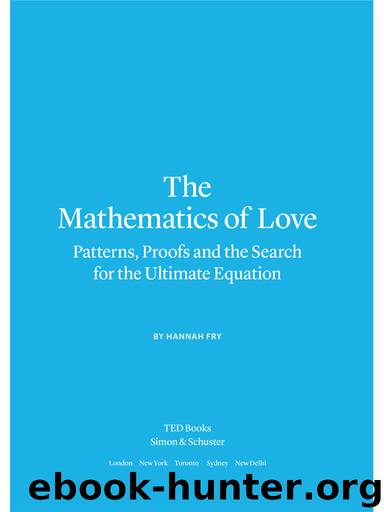The Mathematics of Love by Fry Hannah

Author:Fry, Hannah [Fry, Hannah]
Language: eng
Format: epub
ISBN: 9781471141799
Publisher: Simon & Schuster UK
As with the previous example, the theory8 gets quite heavy in places, but the insights can go some way toward explaining why there are so many fantastic women in their thirties all competing for a seemingly tiny pool of eligible bachelors.
When a weak bidder comes across a man that she likes, she is likely to pull out all the stops to compete for his attention. A strong bidder, on the other hand, confident that she presents a good match for any man, is less likely to go all-out, knowing that another, better man is probably waiting for her just around the corner.
Seeing uninterest from the more attractive woman, the man will then settle down with the woman who shows him the most attention, taking him out of the dating pool.
This is all fine at the beginning, but as the auction (i.e. life) continues and the lots are won by the weaker bidders, a situation arises with only a few decent men left and a much larger number of beautiful and intelligent women all fishing in the same shrinking pool.
The result is the eligible bachelor paradox, and it comes with a clear, if slightly harsh, take-home message: no matter how hot you are, if your goal is partnership, don’t get complacent.
But before we consign ourselves to dying alone and rush out to buy a houseful of cats, it’s worth pausing and looking at these examples objectively. As neat an application of game theory as they are mathematically, they have one flawed assumption at their core: that men are trying to trick women into having sex with them and women are desperate for commitment.
In reality, don’t both sexes want both? Crazily enough, I suspect there may even be some women who want sex and some men who want commitment. And thus this particular game-theory house of cards comes tumbling down.
Thankfully, there are ways to use game theory that don’t require men and women to conform to stereotypes, and in particular, a formulation that can apply to many of the most common dating conundrums for every type of relationship. We’ll come to that shortly, but first, let me describe the background theory in a simple example: two people deciding whether or not to cheat on their partner in a relationship.
The game of being faithful
We can set this up with a game between two people in an imaginary relationship: Don (in blue) and Betty (in red). Don and Betty are not moral people; they won’t worry about cheating because it’s ‘wrong’. Instead, they just want to end up with the highest scores, or ‘pay-offs’, from their relationship. These pay-offs are determined for each partner by the different strategies they choose to follow, and can be displayed in a table like that below – what’s known in mathematics as a ‘Pay-off Matrix’.
Download
This site does not store any files on its server. We only index and link to content provided by other sites. Please contact the content providers to delete copyright contents if any and email us, we'll remove relevant links or contents immediately.
| Biomathematics | Differential Equations |
| Game Theory | Graph Theory |
| Linear Programming | Probability & Statistics |
| Statistics | Stochastic Modeling |
| Vector Analysis |
Modelling of Convective Heat and Mass Transfer in Rotating Flows by Igor V. Shevchuk(6432)
Weapons of Math Destruction by Cathy O'Neil(6264)
Factfulness: Ten Reasons We're Wrong About the World – and Why Things Are Better Than You Think by Hans Rosling(4731)
A Mind For Numbers: How to Excel at Math and Science (Even If You Flunked Algebra) by Barbara Oakley(3301)
Descartes' Error by Antonio Damasio(3270)
Factfulness_Ten Reasons We're Wrong About the World_and Why Things Are Better Than You Think by Hans Rosling(3230)
TCP IP by Todd Lammle(3180)
Fooled by Randomness: The Hidden Role of Chance in Life and in the Markets by Nassim Nicholas Taleb(3105)
The Tyranny of Metrics by Jerry Z. Muller(3065)
Applied Predictive Modeling by Max Kuhn & Kjell Johnson(3064)
The Book of Numbers by Peter Bentley(2964)
The Great Unknown by Marcus du Sautoy(2690)
Once Upon an Algorithm by Martin Erwig(2641)
Easy Algebra Step-by-Step by Sandra Luna McCune(2628)
Lady Luck by Kristen Ashley(2576)
Police Exams Prep 2018-2019 by Kaplan Test Prep(2540)
Practical Guide To Principal Component Methods in R (Multivariate Analysis Book 2) by Alboukadel Kassambara(2538)
All Things Reconsidered by Bill Thompson III(2389)
Linear Time-Invariant Systems, Behaviors and Modules by Ulrich Oberst & Martin Scheicher & Ingrid Scheicher(2364)
